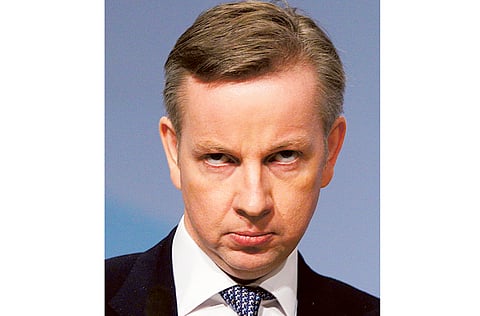Gove apologises to Cameron over row with May
Education Secretary agreed to say sorry over claims of a hardline plot in some Birmingham schools

London: David Cameron’s Government was in crisis on Saturday night after Michael Gove was forced to make a grovelling apology to the Prime Minister for undermining Theresa May — and her spin doctor had to quit for attacking Gove.
The punishments were meted out after a furious Cameron was compelled to intervene to stop a vicious power struggle between Home Secretary May and Education Secretary Gove.
Gove agreed to say sorry after private remarks he made criticising her and Home Office counter-terrorism boss Charles Farr at a lunch with Times newspaper executives over the Home Office’s handling of extremism in schools appeared in the media.
Gove apologised to both Cameron and Farr.
May’s spin doctor, Fiona Cunningham, was forced to quit for leaking a damaging private letter to Gove written by May. To add to the emotional turmoil surrounding the dispute, Cunningham is in a relationship with former spy Farr.
The Gove-versus-May feud is part of a wider battle over who will succeed Cameron as Tory leader. May has emerged as favourite, with Gove said to be determined to stop her on behalf of his ally, Chancellor George Osborne.
Cameron issued a statement last night after Cabinet Secretary Sir Jeremy Heywood interrogated Gove, May and Cunningham over the spectacular fall-out.
It said: “In relation to unauthorised comments to the media about the Government’s approach to tackling extremism and the improper release of correspondence between Ministers, the Prime Minister has received the Cabinet Secretary’s review establishing the facts behind these events.
“In acknowledgement of his role, the Secretary of State for Education has written separately to Charles Farr and the Prime Minister apologising for the original comments made to The Times newspaper. In addition, in relation to further comments to The Times, Fiona Cunningham has today resigned.”
The Tory bloodletting was sparked by a war of words between May and Gove over the alleged Trojan Horse extremist plot to infiltrate schools in Birmingham.
At one stage, rumours swept senior Conservative circles yesterday that Gove, one of Cameron’s closest personal and political allies, could be forced to quit as Education Secretary. And some Conservative MPs said May was prepared to resign if Cunningham was fired.
Sir Jeremy Heywood told Cameron he must take firm action against Gove and Cunningham.
The dispute started when Gove claimed at a private lunch with Times newspaper bosses that May and Farr had not done enough to tackle extremism in schools, in particular, the alleged attempt to take over state schools in Birmingham.
When Gove’s comments appeared in the media, Cunningham launched a ferocious counter-attack. She published a hostile private letter to Gove from May, accusing him of failing to act when concerns about extremism in Birmingham schools were first brought to his attention in 2010. In the letter, May also criticised him for calling for curbs on the wearing of headscarves by Muslim girls in schools.
Cunningham took the extraordinary step of publishing the document in the early hours of Wednesday morning on the Home Office website. An unnamed Home Office aide told the media Gove was trying to shift the blame for the Trojan Horse plot from himself to May.
The Education Secretary and his team “have got a problem and they are trying to make it someone else’s problem,” said the unnamed official, thought to be Cunningham.
Sir Jeremy asked Gove why he had briefed against a fellow Minister and mandarin. May and Cunningham were asked why they had hit back in kind and published private correspondence from one Minister to another. All three were accused of flouting ministerial and Whitehall codes of conduct.
Cameron was furious that the argument between May and Gove overshadowed last week’s Queen’s Speech. Even more embarrassingly, he was forced to interrupt his attendance at the G7 summit in Brussels to respond, vowing: “I will get to the bottom of who has said what and what has happened and sort it all out.”
The row has echoes of a similar Cabinet power struggle between Margaret Thatcher and her Tory rival Michael Heseltine, in which a Whitehall press aide accused of dirty tricks became involved. The simmering tension between the pair came to a head in 1986 in a dispute over the future of the UK’s struggling Westland helicopter company.
Pro-European Heseltine, then Defence Secretary, backed a European rescue; Euro-sceptic Thatcher, supported by Trade Secretary Leon Brittan, wanted a US-based rescue.
Just like Cunningham, Brittan’s formidable head of communications, Colette Bowe, was caught red-handed leaking a letter in an attempt to defend her boss and damage Heseltine. The rift led to both Heseltine and Brittan leaving the Cabinet. Four years later Heseltine launched a leadership bid against Thatcher. He succeeded in toppling her, but lost out to John Major in the leadership contest. Bowe — now Dame Colette Bowe — is now head of media regular Ofcom.
Sign up for the Daily Briefing
Get the latest news and updates straight to your inbox



